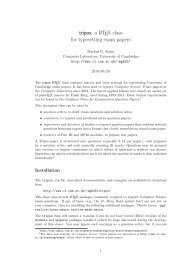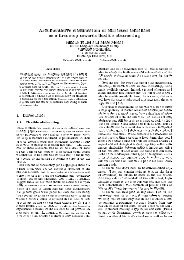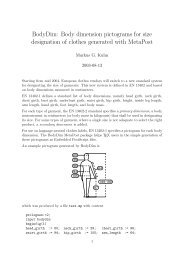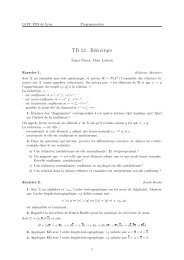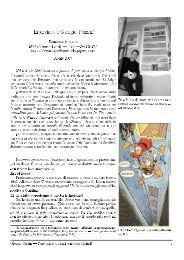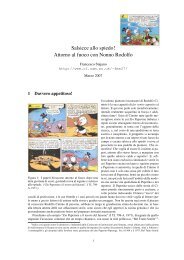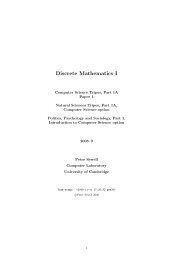Radical innovation: crossing knowledge boundaries with ...
Radical innovation: crossing knowledge boundaries with ...
Radical innovation: crossing knowledge boundaries with ...
You also want an ePaper? Increase the reach of your titles
YUMPU automatically turns print PDFs into web optimized ePapers that Google loves.
problems of society are complex - at one of our workshops we heard about the<br />
development of the ‘Social Exclusion Unit’ under Blair’s Labour government, an<br />
organisation formed to address the problems of those people who suffer compound<br />
disadvantages (economic, educational, health, criminal) that effectively exclude them<br />
from society. Social problems cross the <strong>boundaries</strong> by which public and<br />
organisational life is structured. Nevertheless, the expert <strong>knowledge</strong> from which<br />
problems are addressed must develop <strong>with</strong>in departmental contexts, where peer<br />
recognition is given for simple stories, because it is so much more persuasive to<br />
describe, publish, advocate and ‘solve’ a simple problem than a messy one.<br />
Furthermore, it is hard to say what the success criteria should be for a messy problem.<br />
It is normally the success criteria that are used to refine the question, so <strong>with</strong>out them,<br />
the question remains unanswerable. Finally experts speak from the structural<br />
perspective of their own expertise, which can produce an answer to the wrong<br />
question. The Social Exclusion Unit faced all of these challenges, but had been<br />
established in part as a demonstration of the value of boundary-<strong>crossing</strong>, so in our<br />
terms was an experiment in interdisciplinary <strong>innovation</strong>.<br />
If we contrast this kind of problem <strong>with</strong> academic research problems, it is clear that<br />
scientific investigation makes only limited contributions. Furthermore, the lack of<br />
<strong>boundaries</strong> or controls on the problem makes it hard to formulate an analytic or<br />
experimental approach. There is certainly ample opportunity for investigation by<br />
motivated and curious individuals, but the freedom to immerse yourself in complex<br />
problems is not consistent <strong>with</strong> the conventional administration of scientific research.<br />
Perhaps ironically, the lack of intellectual <strong>boundaries</strong> around such complex applied<br />
problems means that they might represent more ‘pure’ science, science for its own<br />
sake, than the kinds of science done <strong>with</strong>in an academic career. The opportunity to<br />
engage intellectually <strong>with</strong> complex problems is a rare privilege, and leaves the<br />
researcher responsible for choice of problems to work on. Complexity therefore<br />
highlights the individual conscience and public awareness of the researcher, and also<br />
brings responsibility to educate and communicate <strong>with</strong> the public (although this kind<br />
of translation activity is also not seen as being a real part of science).<br />
Intervention and delivery<br />
One response to complex problems is to attempt the construction of a grand<br />
explanatory theory that will integrate the various perspectives for analysis. These<br />
theories tend implicitly to contain <strong>with</strong>in them the assumption of a certain kind of<br />
intervention. Complex systems theories emphasise the possibility of emergent patterns<br />
of behaviour, interacting influences, and the importance of developing appropriate<br />
feedback mechanisms. Economic theories might emphasise the balance and<br />
mobilisation of resources. In all cases, analytic perspectives often bring <strong>with</strong> them<br />
established disciplinary ownership, and interventions are associated <strong>with</strong><br />
organisational delivery structures. The construction of a holistic theory, <strong>with</strong>in an<br />
interdisciplinary collaboration, therefore presumes a certain subordination relationship<br />
between the disciplines involved. Where there is no clear prior disciplinary affiliation,<br />
these theories may be associated <strong>with</strong> personal expert branding or the adoption of an<br />
Innovation and Interdisciplinarity 23



